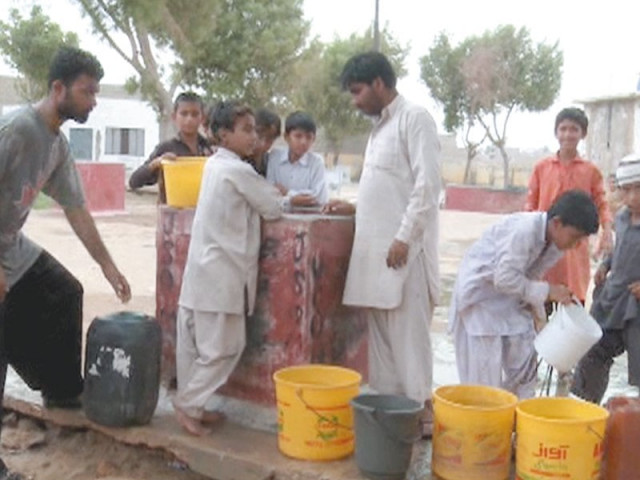Polluted underground water: Water insecurity threatens survival of Malir dwellers
Main water pipeline from Keenjhar Lake to Karachi passes through these villages .

Due to the contamination of underground water in Malir district, villagers have to travel a distance of one kilometres to obtain sweet water from wells of nearby agricultural lands. PHOTOS COURTESY: HEALTH AND NUTRITION DEVELOPMENT SOCIETY
“Look at this well. We dug it up a few months ago, but it is also now contaminated. We are tired of looking for a land where we can find underground potable water to quench the thirst of our children.”
These concerns were not expressed by the people of Tharparkar district or those living in Kohistan or Kachho areas of rural Sindh, where clean drinking water is a rare commodity, but by people living in the centuries-old villages in the Malir district of Karachi. These villages were once fertile for agriculture purposes.

“The main water pipeline was laid down by our parents, who worked as labourers on daily wages. At that time, they had requested the contractors, government officials and politicians to provide a connection to our village as well. But their pleas fell on deaf ears,” said community chief Meeral Jokhio, adding that the struggle to fetch clean drinking water continues till day as they dig up one well after the other.
To further assert his statement, Jokhio pointed his fingers to the nearby main water line passing through their village carrying water from Keenjhar Lake to Karachi.
Self help
During a visit to the areas, it emerged that many people have dug up water wells and installed hand pumps near the agriculture lands, but hardly anyone gets potable water. The villages in the limits of UC Darsano Chano, UC Memon Goth, UC Ghaghar, UC Gadap and UC Gujjro — part of Karachi metropolitan city — are the worst affected areas, where it is the job of the women to fetch drinking water.

The dumpy roads and streets of the villages are riddled with garbage leaving hardly any place to park vehicles. Flags of Pakistan Peoples Party (PPP) are hoisted on the houses with portraits of party leaders on the walls. But, looking at the poor condition of these people, it was evident how the incumbent rulers have ignored these ‘jiyalas’.
The villagers have made many attempts to install hand pumps in their village, but the underground water is brackish. Therefore, they have no other option but to walk a distance of one kilometre or so to obtain sweet water at the agriculture lands. “Earlier, we used to carry matkas (earthen pots) to fill up water, but now we have plastic drums. Some young women still carry matkas, but I prefer to go on a donkey cart to fill five to six drums which are sufficient for my four family members,” said Husna Khaskheli of Khair Muhammad Khaskehli Goth.
“It takes a few hours if you walk,” she said, adding that some influential people with the help of relevant officials have obtained illegal water connections from the main water line for their farms houses, but the villagers are deprived of this facility.
Health woes
“Seventy per cent of the people living in Malir, Gadap and Bin Qasim areas have no tap water facility. Even those who have access to it are getting contaminated water,” said Mumtaz Khaskheli of the Health Nutrition Development Society (Hands) referring to a study conducted by his organisation in collaboration with the Aga Khan University.
The survey covers demographic, water, sanitation, hygiene and health issues. The findings of survey tell that every tenth person of this area is suffering from hepatitis. “The consumption of contaminated water is one of the factors behind the spread of diseases. I think this area is worst hit by hepatitis,” said Khaskheli, adding that three former union council nazims were among dozens of people who have lost their lives because of this deadly disease.
Published in The Express Tribune, January 20th, 2014.



















COMMENTS
Comments are moderated and generally will be posted if they are on-topic and not abusive.
For more information, please see our Comments FAQ